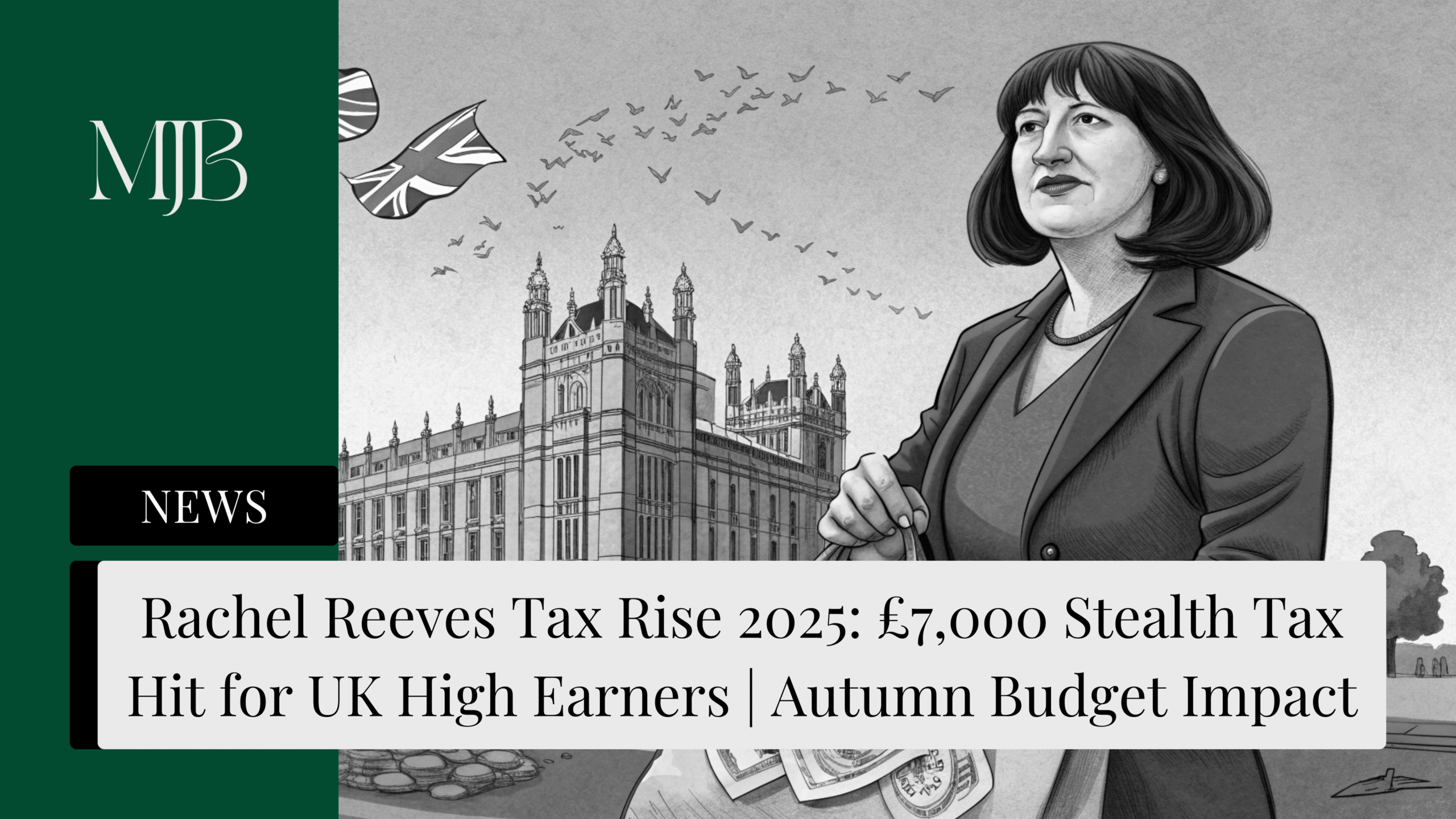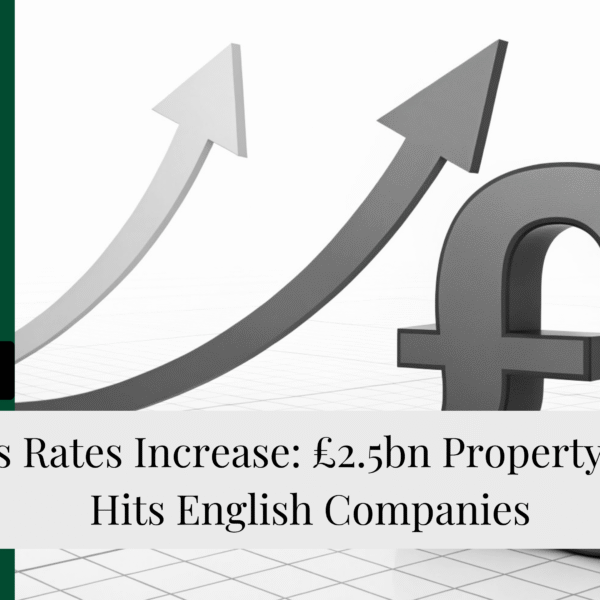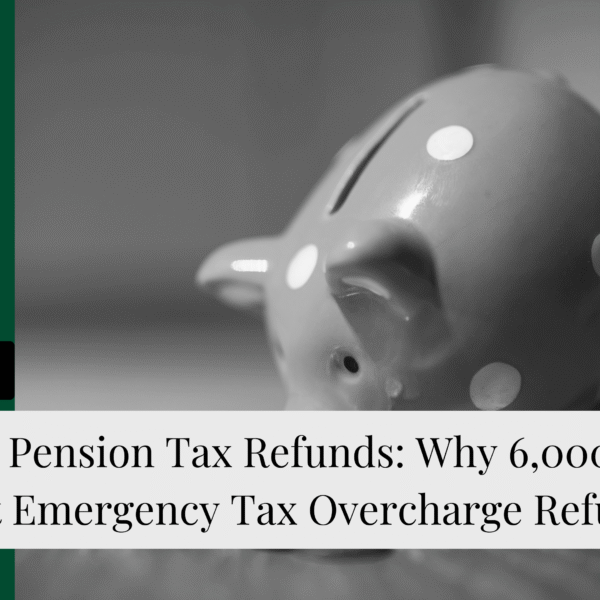Rachel Reeves stealth tax plans could cost UK high earners £7,000 extra annually. The Chancellor’s frozen income tax thresholds strategy would drag 1.4 million British taxpayers into higher tax brackets without officially raising income tax rates – pure fiscal drag in action.
With the autumn Budget 2025 approaching and £50bn in tax rises needed, Reeves’ stealth tax on high earners looks increasingly likely. Rathbones analysis reveals exactly how much extra income tax you’ll pay if these frozen thresholds extend beyond 2028.
What Is Rachel Reeves’ Stealth Tax Strategy?
Rachel Reeves’ stealth tax works through frozen income tax thresholds – a fiscal drag mechanism where tax bands stay static while salaries rise with inflation. This income tax freeze pushes more UK taxpayers into higher brackets automatically.
The current income tax threshold freeze expires in 2028, but the Chancellor faces pressure to extend it. Why? Because stealth tax generates massive revenue without the political cost of announcing direct tax rises.
How frozen income tax thresholds create stealth tax:
- Your salary increases with inflation
- Income tax bands remain frozen at 2021 levels
- More of your income gets taxed at higher rates
- Treasury income rises without official tax rate changes
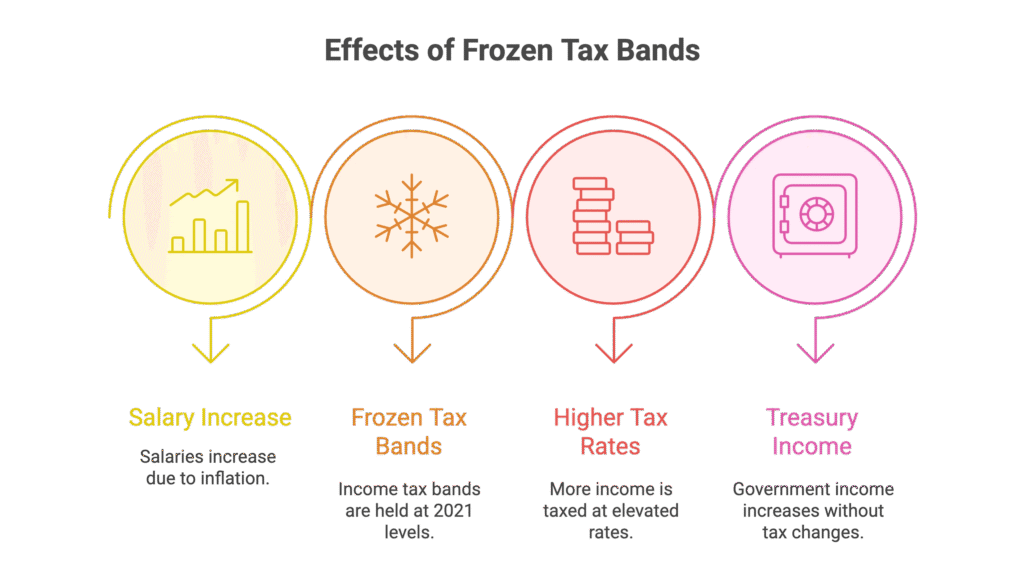
UK High Earners Face £7,000 Income Tax Hit Under Rachel Reeves Plans
Rathbones’ income tax analysis reveals the true cost of Rachel Reeves’ stealth tax strategy for British high earners:
Income Tax Increases by Salary Band:
- £100,000+ earners: £7,000 extra annual income tax
- £80,000 earners: £5,635 additional tax burden yearly
- £50,000 earners: £4,632 more income tax per year
The stealth tax would drag 1.4 million UK taxpayers into the highest rate bracket (£125,140+), creating a significant income tax windfall for Rachel Reeves’ Treasury.
Ade Babatunde from Rathbones explains: “It’s taxation by stealth: income tax rates stay the same, but a bigger slice of your pay disappears into the taxman’s coffers.”
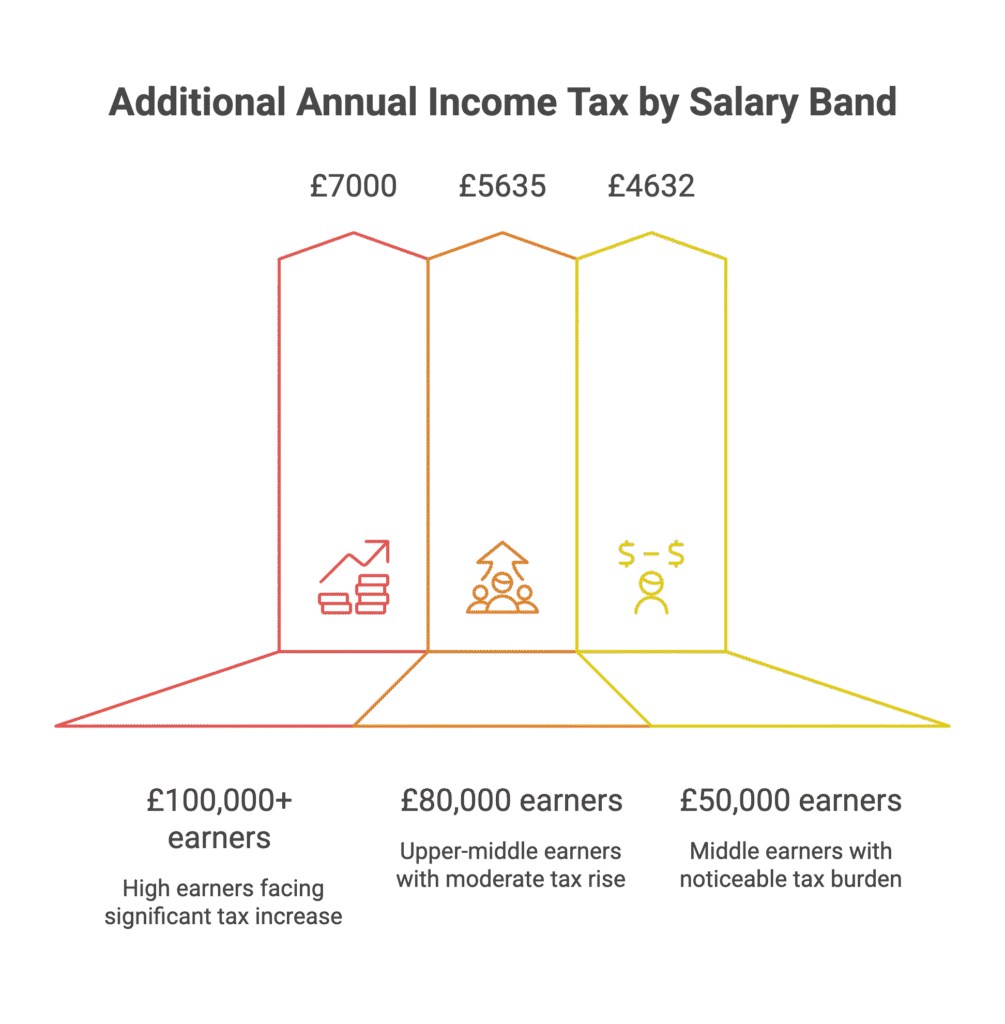
Why Rachel Reeves Needs £50bn in Tax Rises for Autumn Budget 2025
The Chancellor’s fiscal headroom stands at just £9.9bn – the third-smallest since 2010. Rachel Reeves’ “iron clad” fiscal rules demand day-to-day spending matches tax receipts, creating enormous pressure for autumn Budget tax rises.
Treasury revenue requirements:
- Conservative estimate: £10bn (JP Morgan analysis)
- Pessimistic scenario: £50bn (National Institute projection)
- Current fiscal headroom: £9.9bn (insufficient)
July’s income tax receipts jumped to £4.5bn, with self-assessment payments surging 21% year-on-year. This demonstrates how frozen income tax thresholds already boost Treasury income through fiscal drag.
The Chancellor’s spending commitments and Labour policy U-turns have eliminated most of her fiscal wiggle room, making stealth tax extensions almost inevitable.
UK Income Tax Burden Rising £89bn Through Fiscal Drag
British taxpayers face paying an estimated £89.2bn more in income tax this year, primarily from existing frozen thresholds creating fiscal drag as wages rise.
Sarah Coles from Hargreaves Lansdown warns: “The frozen income tax thresholds are systematically pulling more UK taxpayers into expensive tax bills as wages rise with inflation.”
This stealth tax impact affects millions before Rachel Reeves even announces autumn Budget changes. Extending frozen thresholds beyond 2028 would amplify this fiscal drag dramatically.
Current fiscal drag impact:
- 1.4 million pushed into higher income tax brackets
- £89.2bn additional tax burden across UK taxpayers
- 21% increase in self-assessment income tax payments
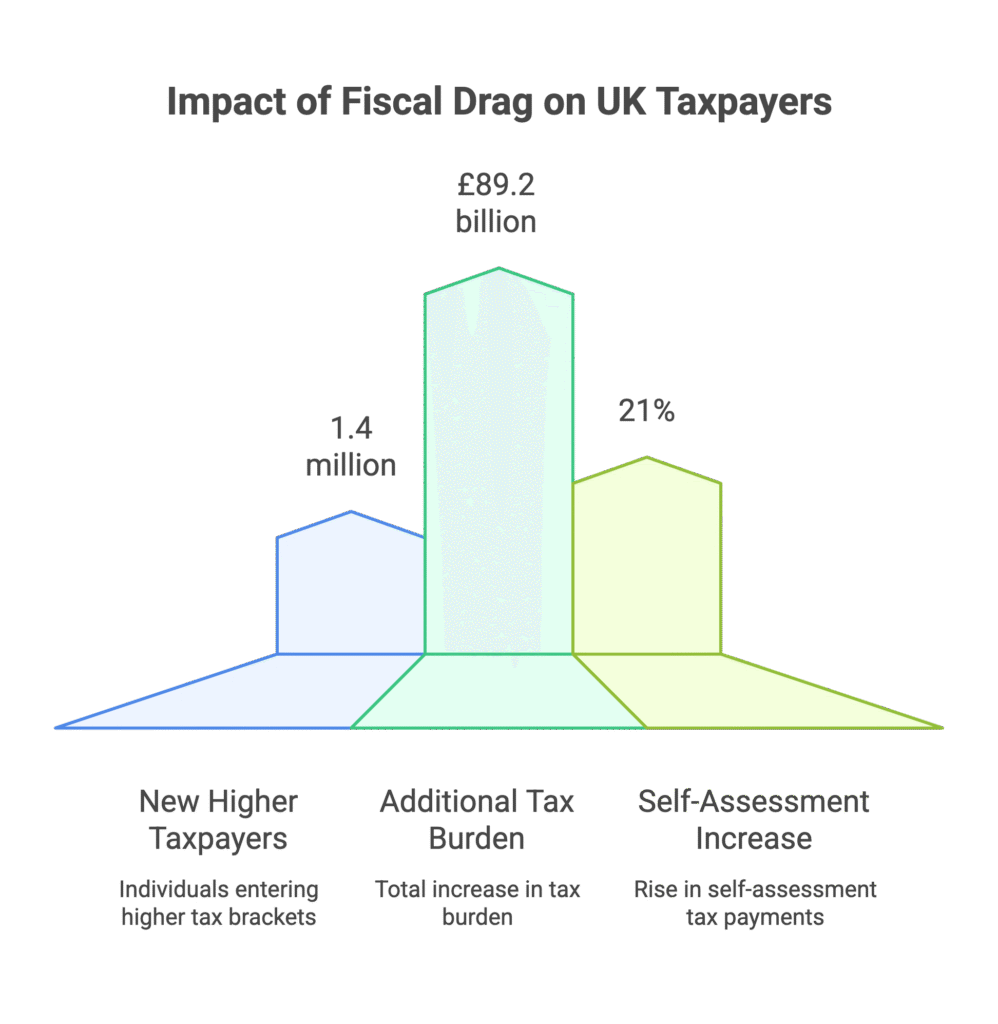
How to Minimise Rachel Reeves’ Stealth Tax Impact on Your Income
UK high earners can reduce their stealth tax burden through strategic tax planning before the autumn Budget 2025:
Income tax mitigation strategies:
- Maximise pension contributions (up to £60,000 annual allowance)
- Utilise salary sacrifice schemes for cars, bikes, childcare
- Optimise ISA contributions (£20,000 tax-free annually)
- Consider dividend tax planning for business owners
- Time bonus payments strategically across tax years
Professional tax advice becomes crucial as Rachel Reeves’ frozen income tax thresholds create more complex planning scenarios for UK high earners.
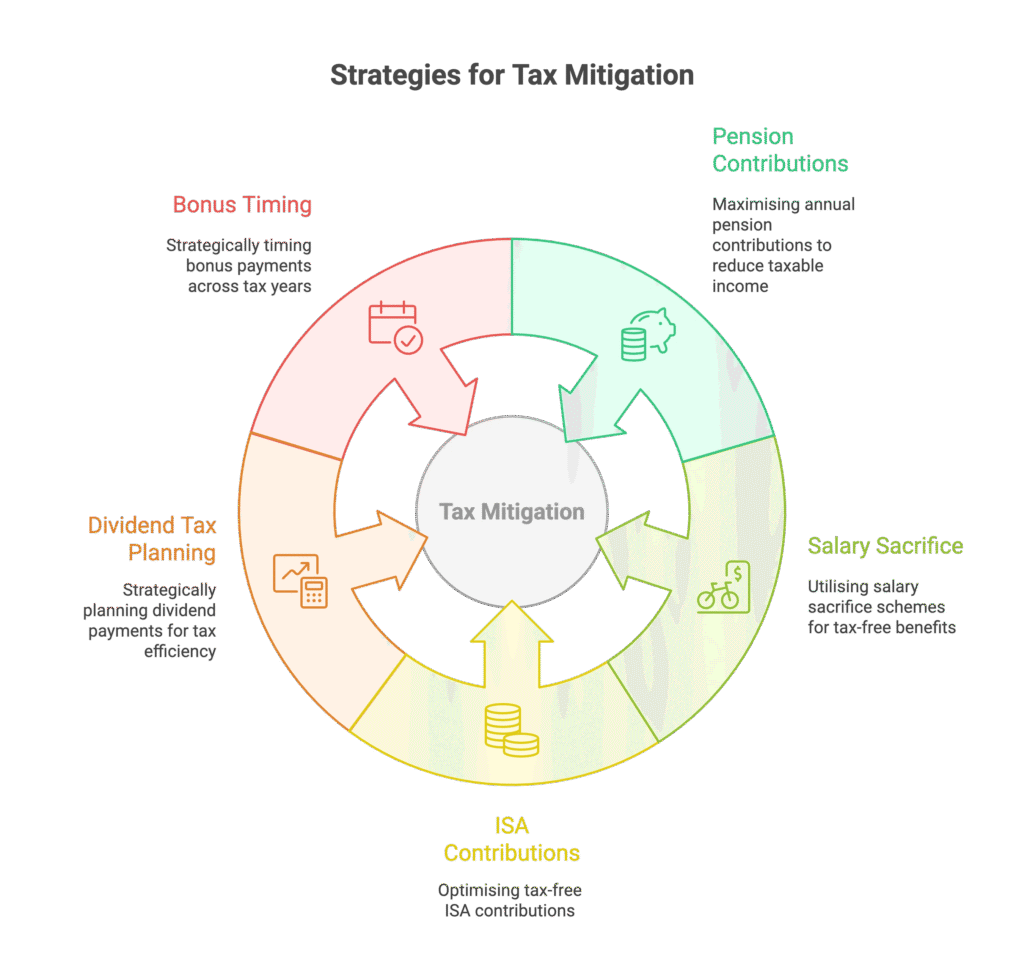
Autumn Budget 2025: What to Expect from Rachel Reeves
The Chancellor faces a stark choice: extend frozen income tax thresholds or find alternative tax rises worth £50bn. Political pressure favours stealth tax over direct income tax rate increases.
Watch for these autumn Budget announcements affecting UK taxpayers:
- Income tax threshold freeze extension beyond 2028
- Capital gains tax rate changes for high earners
- National insurance contributions adjustments
- Pension tax relief modifications
Rachel Reeves’ autumn Budget will determine whether this stealth tax becomes a permanent feature of UK income tax policy.
FAQ: Rachel Reeves Stealth Tax and UK Income Tax Changes
Q1: What exactly are Rachel Reeves’ frozen income tax thresholds?
A: Income tax bands fixed at 2021 levels despite inflation, creating fiscal drag as salaries grow but tax-free allowances stay static. More income gets taxed at higher rates without official tax rises.
Q2: How much extra income tax will UK high earners pay under Rachel Reeves’ plans?
A: High earners (£100k+) face £7,000 additional annual income tax, £80k earners pay £5,635 more yearly, and £50k earners see £4,632 extra tax burden under the stealth tax extension.
Q3: Why does Rachel Reeves prefer stealth tax over direct income tax rises?
A: Frozen thresholds let the Chancellor increase Treasury income without breaking manifesto promises about income tax rates. It’s politically safer than announcing direct tax rises for UK taxpayers.
Q4: When will Rachel Reeves announce income tax changes?
A: The autumn Budget 2025 will reveal the Chancellor’s tax strategy. With £50bn needed and limited options, extending frozen income tax thresholds beyond 2028 seems highly probable.
Q5: Can UK taxpayers reduce their stealth tax burden?
A: Yes, through pension contributions, salary sacrifice schemes, ISA investments, and strategic tax planning. Professional advice helps navigate Rachel Reeves’ complex stealth tax landscape effectively.
Protect your wealth from Rachel Reeves’ stealth tax changes. Get expert tax planning advice and stay ahead of autumn Budget 2025 announcements affecting UK high earners.
DISCLAIMER
Effective Date: 15th July 2025
The information provided on this website is for informational and educational purposes only and reflects the personal opinions of the author(s). It is not intended as financial, investment, tax, or legal advice.
We are not certified financial advisers. None of the content on this website constitutes a recommendation to buy, sell, or hold any financial product, asset, or service. You should not rely on any information provided here to make financial decisions.
We strongly recommend that you:
- Conduct your own research and due diligence
- Consult with a qualified financial adviser or professional before making any investment or financial decisions
While we strive to ensure that all information is accurate and up to date, we make no guarantees about the completeness, reliability, or suitability of any content on this site.
By using this website, you acknowledge and agree that we are not responsible for any financial loss, damage, or decisions made based on the content presented.

